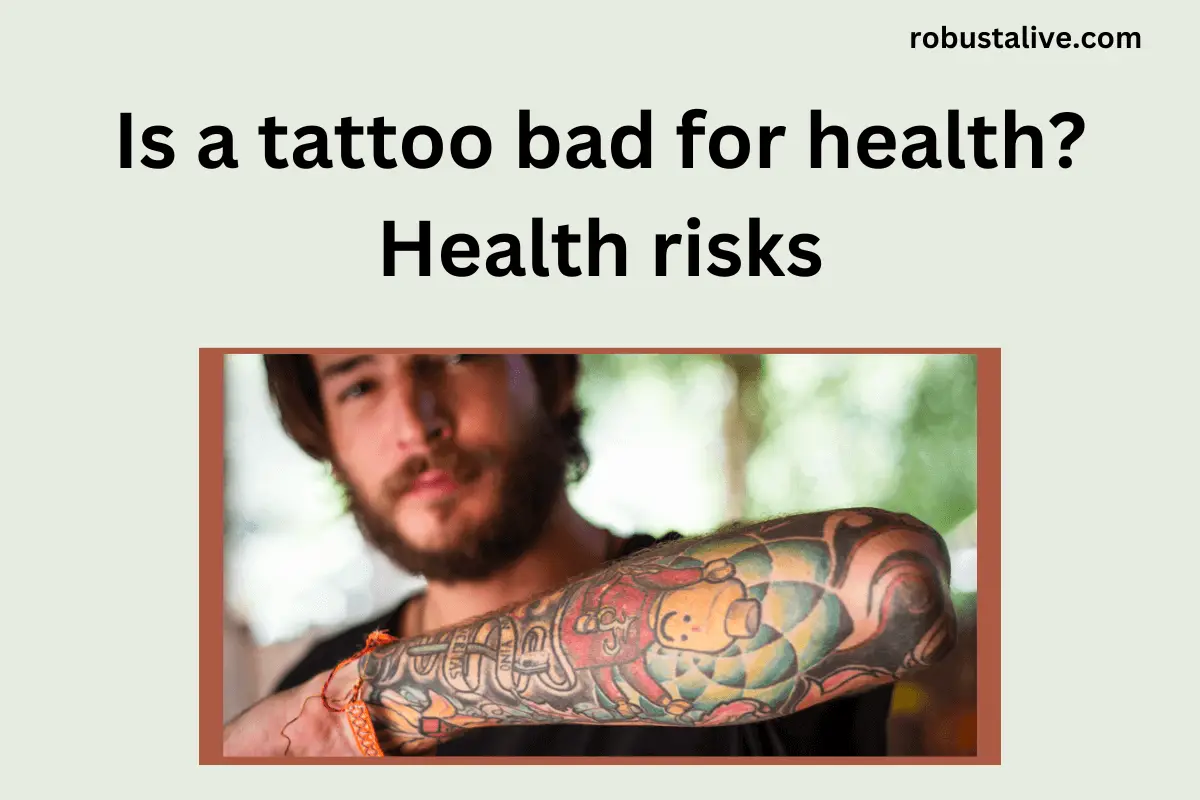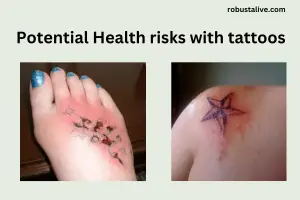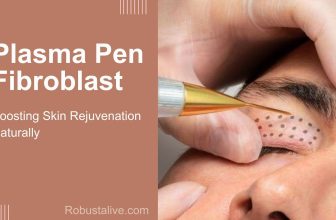Is a tattoo bad for health? Health risks

Getting a tattoo is not something new. It’s a very old we all know as belonging to the Otzi, also known as the Iceman. According to the Journal of Archaeological Science, in 2016, research claims that this man had 62 tattoos scattered around his body and died around 3250 BC.
After 5000 years tattoos become very common. An Ipsos poll in August 2019 found that around 30% of Americans have tattoos. Among this 30%, most people are satisfied with the ink. But still, this body modification doesn’t come without any health risks. In addition, the FDA doesn’t control the tattoo parlours and doesn’t have any role in approving the ink for the tattoos. However, it plays a role in the tracking of its adverse effects.
The removal of a tattoo is a very pricey yet painful procedure. Here are the complete details that you need to know before getting a tattoo, what to look for, precautions, and aftercare measures.
Potential Health risks with tattoos

There are no restrictions against a tattoo, but here are some potential health risks you must consider before getting one. These health risks include:
Allergic reaction
Many people get allergic reactions after getting a tattoo. The leading cause of allergic reactions is the type of ink in the tattoo. You will be more prone to allergic reactions if you have a history of sensitive skin and allergies.
Here are some common symptoms that result from a tattoo related allergic reactions:
- Itching
- Swelling
- Blistering
- Redness
- Hives or rashes
Allergic reactions usually occur immediately or within hours after getting a tattoo. But it’s also possible to develop these symptoms after years of getting them.
Keloids
Keloids are the raised skin areas that are the same as the skin colour. You may notice them after getting a tattoo. They are painless, but they can be a cosmetic problem for some. Though it’s not common, some people can get scars after getting a tattoo.
Skin infection
The contamination of the tattooing tools and the unsterile needles can develop a skin infection. You need to take proper aftercare of your tattoo to avoid getting an infection. The common symptoms of a skin infection include:
- Pain
- Swelling
- Redness
- Discharge
- Itchiness
- Chills
- Open sores
- Fever
If you are experiencing these symptoms, you must see a doctor for early treatment. They will help you by prescribing some antibiotics for your condition or what they think can help you improve it. And to prevent any scarring, you must follow your Doctor’s aftercare instructions.
Infectious diseases
It is strictly advised to professional means licensed tattoo artists to use sterilized needles to tattoo their customers. As unsterilized needles are linked with a high risk of some infectious diseases like:
- HIV/ AIDS
- Hepatitis C
- Methicillin-resistant Staphylococcus aureus (MRSA)
No exact relationship exists between having a tattoo and hepatitis C, HIV/AIDS, and cancer. Only the unsterilized use of needles is the main cause behind it.
MRI complications
Tattoo individuals can experience pain and burning in their tattoos when they get an MRI. It is generally seen in individuals with many tattoos around their bodies. If you have only one or two small tattoos around your body then MRI complications will probably not affect you.
Scarring
The tattooing procedure can sometimes create a deep wound in the middle layer of our skin. Aftercare is vital to help your wound heal faster. Taking proper care will help the tattoo heal faster and see the original tattoo you always wanted.
However, a tattoo that doesn’t correctly heal will result in scars, skin infections, and allergic reactions. Besides, scratching your new tattoo can increase the risk of scars. In case of scarring, your tattoo will not look good due to the uneven ink and bumps around the skin. Such bumps on the tattoos due to the scarring are known as keloids.
Keloids can take up to 3 to 12 months to form. The treatment will depend upon the scary condition; the dermatologist can also recommend surgical procedures in severe cases.
Can tattoos result in cancer?
Is a tattoo bad for health? Research has shown a possible connection between the can and tattoos for years, but any direct link between cancer with a tattoo is still considered a myth. There is no solid evidence between a tattoo and skin cancer. But some researchers believe that there can be a coincidence between these two.
Some pigments have potentially harmful substances like:
- Mercury
- Plastics
- Barium
- Cadmium
- Minerals
- Alcohols
- Vegetable dyes
- Copper
- Nickel
But overall, the tattoo ink is way safer than the one used in the old days. But still, for precautionary measures, ask your tattoo artist about the type of ink he is using on your skin. Besides, remember that no tattoo ink is approved by the FDA (food and drug administration).
Prepare yourself
Before getting a tattoo, mentally prepare yourself. If you are unsure about getting a tattoo or are scared that you might regret it later, then delay it for the time being. Don’t pressure yourself to get a tattoo. Carefully select the location of your tattoo and if you ever want to hide it in the clothing.
In addition to the location, consider the weight gain and loss. The sudden weight gain in pregnancy can distort the tattoo; once you lose weight, your tattoo appearance will be affected.
How to prevent the tattoo side effects?
Make sure you don’t have any infection or skin condition before going to your appointment. Carefully select the location of your tattoo. Avoid getting one over the bony areas if you are very sensitive to pain. As I mentioned above, weight gain and pregnancy can disrupt the design of your tattoo. It also depends on the location, as some areas have more weight gain than others.
Make sure to get a tattoo only from a professional and licensed artist. A licensed tattoo artist is trained to deal with any skin-related issues that can occur. You can also ask him about the equipment, ink, and anything related to the procedure.
Keep track of the sanitization and disinfection of un-disposable materials. It’s essential to avoid getting any infection or blood-borne disease. Before getting your tattoo, here are a few questions you must consider:
- Experience and licensing
- Wearing gloves
- The type of ink he is using
- Sanitation process
- How is he handling and disposing of material
- Work portfolio.
Before getting a tattoo, you can have a skin checkup from a dermatologist. It’s especially vital if you have a mole or skin tag around the area, as sometimes the tattoo can cover the skin issues, making it more difficult to detect skin cancer or other skin issues. Professionals don’t recommend getting a tattoo over your moles.
Aftercare of the tattoo
Good aftercare is essential for the proper healing of your tattoo. The aftercare depends upon the type and extent of the work done. But generally, here are a few aftercare tips for tattoos:
- Keep your tattoo skin clean by gently using water and soap. And during the shower, avoid direct stream contact with the skin. TO dry the area, gently pat on it and strictly avoid rubbing a towel.
- Apply a mild moisturizer several times a day.
- Avoid going into pools, rivers, hot tubs, lakes, and other water bodies when your tattoo is healing.
- For a few weeks, keep the new tattoo out of sun exposure.
- Avoid wearing clothes that can stick to your tattoo.
- Give at least two weeks of proper aftercare for properly healing your tattoos. Contact your doctor if your tattoo isn’t healing correctly.
If you don’t like the tattoo or aren’t satisfied with it, then consult the dermatologist to see the best option. Depending on the tattoo, location, and other factors, they may suggest laser surgery or other procedures.
Conclusion
Is a tattoo bad for health? Till now, there is no solid proof that getting a tattoo is linked with skin cancer. However, some ingredients are considered carcinogenic, but still, there is no evidence that can prove their direct link with cancer.
FDA does regulate any tattooed skin. Until we know everything about the carcinogenic character of some specific inks, you can ask your tattoo artists about the pigments, plastics, metals, or any other harmful material in the ink pigment.
There are risks of getting other side effects, especially if you are going to an unlicensed artist or need to follow the proper aftercare protocols. Some risks include allergic reactions, skin infections, keloid scarring, and MRI complications.
Consult the tattoo artist about the concerns you are having about the ink. Do make a visit for a skin checkup before getting a tattoo.
FAQ’s
-
Are tattoos harmful to blood?
Getting a tattoo can put your blood at high risk of contamination from the tattooing needle. Many licensed professionals adhere to the proper health regulations, while some let many things slip. Such irresponsible tattoo parlours can increase the risk of infections from Staphylococcus aureus and hepatitis B and C.
-
Does a tattoo affect the immune system?
When you get a tattoo, your immune system starts working to fight the risk of infection. But according to the research, it does not happen around the tattoo site, but the whole body as the response continuously increases.
-
Who should avoid getting tattoos?
People on blood thinners should avoid getting tattoos as they can cause excessive bleeding. Excessive bleeding is not good while getting tattoos and will increase the risk of complications. Pregnant women, breastfeeding moms, and people on anti-rejection medications due to the organ transplant must consult with their Doctor as there are greater chances of infection.
-
Is a tattoo bad for health?
Tattoos can activate the inflammatory and autoimmune condition of the skin. Besides, there have been reports of a rare condition called sarcoidosis that develops years after the tattoo. So it’s essential to notice any changes in your tattoos, especially the bumpiness in your skin.
-
Does tattoo ink affect the organs?
There are some pigments present in the tattoo ink that can cause serious harm. Mercury is a neurotoxin that can damage the nervous system and brain, leading to psychological and physical disorders. In severe cases, it can damage tissue and organ and affect the bones, heart, and even the reproductive system.
-
Can people having tattoos donate blood?
If you recently have a tattoo or body piercing, you can’t donate blood for at least six months after getting it done.
-
What are the disadvantages of tattoos?
Tattoos make minimal holes in the skin that make it prone to the complications like skin infection and allergic reactions. Tattoo dyes, especially red, yellow, green, and blue, can cause an allergic reaction to the skin, like irritation and itchiness. It can even occur years after getting your tattoo.
References:
- https://www.healthline.com/health/can-tattoos-cause-cancer
- https://www.healthline.com/health/tattoo-side-effects
- https://www.pennmedicine.org/updates/blogs/health-and-wellness/2018/july/tattoo-health-risks
- https://www.news24.com/life/wellness/body/condition-centres/skin/about-skin/5-dangerous-health-risks-of-tattoos-20180504
- https://www.livestrong.com/article/13771551-are-tattoos-unhealthy/
- https://www.dmarge.com/do-tattoos-cause-cancer





